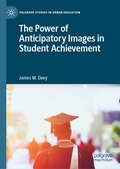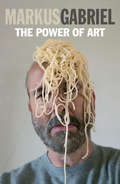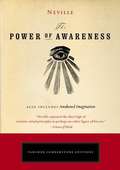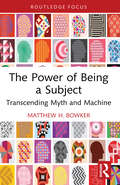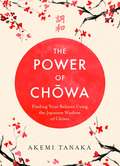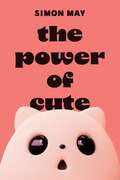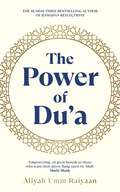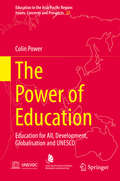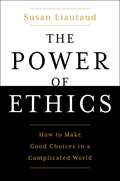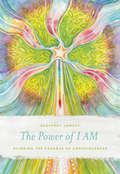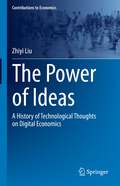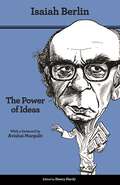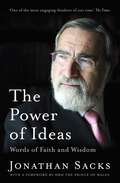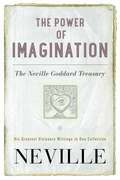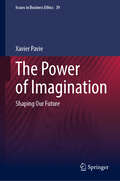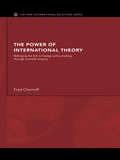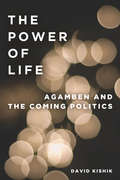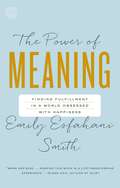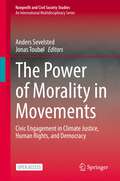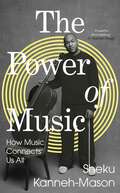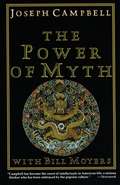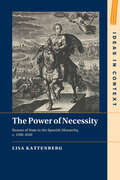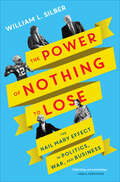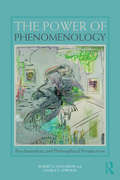- Table View
- List View
The Power of Anticipatory Images in Student Achievement (Palgrave Studies in Urban Education)
by James M. DavyThis book features ten high academically achieving, low-income, inner city students from Newark, New Jersey, who graduated from public high schools at or near the top of their class and continued to excel in college. Using a qualitative research design, the author interviewed the ten students and the person who most influenced their educational progress about what motivated them to achieve at such high levels. Three mutually reinforcing anticipatory images emerged as a common element of their stories. In their own voices, the students describe the anticipatory images they framed, how they developed them, and how they used them to their advantage. Davy advances a theoretical model of the Anticipatory Competent student who continually progresses in the directions of the images projected ahead.
The Power of Art
by Markus GabrielWe live in an era of aesthetics. Art has become both pervasive and powerful – it is displayed not only in museums and galleries but also on the walls of corporations and it is increasingly fused with design. But what makes art so powerful, and in what does its power consist? According to a widespread view, the power of art – its beauty – lies in the eye of the beholder. What counts as art appears to be a function of individual acts of evaluation supported by powerful institutions. On this account, the power of art stems from a force that is not itself aesthetic, such as the art market and the financial power of speculators. Art expresses, in a disguised form, the power of something else – like money – that lies behind it. In one word, art has lost its autonomy. In this short book, Markus Gabriel rejects this view. He argues that art is essentially uncontrollable. It is in the nature of the work of art to be autonomous to such a degree that the art world will never manage to overpower it. Ever since the cave paintings of Lascaux, art has taken hold of the human mind and implemented itself in our very being. Thanks to the emergence of art we became human beings, that is, beings who lead their lives in light of an image of the human being and its position in the world and in relation to other species. Due to its structural, ontological power, art itself is and remains radically autonomous. Yet, this power is highly ambiguous, as we cannot control its unfolding. In this book, a leading proponent of New Realism applies this philosophical perspective to art to create a new aesthetic realism.
The Power of Awareness
by NevilleA beautiful edition of one of the twentieth century's most powerful and intriguing works on how to use the manifesting powers of your mind. Features the bonus book, Awakened Imagination. <P><P> Here is a signature volume of one of the most quietly impactful and radical works ever written on the creative potentialities of human thought, The Power of Awareness. In this book, author Neville presents a concise, unforgettable statement of his core philosophy: that the world around you is a picture in your mind's eye, created by your thinking, and susceptible to change by altering your thoughts and feelings. Originally published in 1952, The Power of Awareness not only prefigured the revolution in mind-power metaphysics, but surpassed it. Before the public had heard about quantum physics experiments (popularized in our own time through movies such as The Secret and What the Bleep Do We Know!?), Neville was conveying the unheard-of message that reality is directly impacted by the perspective and consciousness of the observer himself. Moreover, he wrote, each of us is ultimately responsible for, and capable of reshaping, the outer circumstances we perceive. Neville's authorial genius is his ability to deliver these ideas in an immensely readable and enjoyable way. Like few other metaphysical figures of his era, Neville captured complexities in simple stories, memorable examples, and practical advice. His books are unfailingly brief and easy to read, because his command of his material is so masterly and complete. The Power of Awareness also includes a special bonus work, Awakened Imagination, originally published in 1954. This two-in-one volume forms a brilliant introduction and user's guide to the practical philosophy of a great spiritual thinker.
The Power of Being a Subject: Transcending Myth and Machine (Routledge Focus on Mental Health)
by Matthew H. BowkerAmid countless prescriptive self-help manuals, The Power of Being a Subject: Transcending Myth and Machine emerges as a refreshing intellectual cornerstone in contemporary psychology and personal development literature.Dr. Bowker dismantles the persistent "myth of human mechanics" – the flawed belief that individuals and their psyches "function" like computers or machines. He argues compellingly that authentic self-improvement demands embracing our full subjectivity, with all of its putative dysfunction, and recognizing our agency, creativity, and complexity. Through thoughtful exploration, readers learn how critical thinking, honesty, patience, and bravery can help them achieve deeper maturity and genuine freedom.This is essential reading for those disillusioned with surface-level solutions and hungry for meaningful transformation.
The Power of Chowa: Finding Your Balance Using the Japanese Wisdom of Chowa
by Akemi Tanaka'Following Tanaka's wisdom is an easy way to start making life feel just a little more balanced' the IndependentThe Japanese wisdom of chowa offers a fresh perspective on how to live, and new ways to find balance among the many different directions that modern life pulls us in.Chowa is a Japanese concept that is often translated as 'harmony', but more accurately means 'the search for balance'. Chowa is both a philosophy and a set of practices that can help us get to the heart of what is most important to us, and change our way of thinking about ourselves and others. This book will teach you how to apply the lessons of chowa to your own life to better focus on what really matters and cultivate an everyday state of equilibrium and calm that will help you feel ready for anything. Chowa helps us to better balance our priorities and our relationships and find inner strength and flexibility in times of change and difficulty.Whether you are searching for balance at home, at work, in your relationships or in any other area of your life, chowa offers new solutions and a way of thinking that we could all benefit from, now more than ever.
The Power of Cute
by Simon MayAn exploration of cuteness and its immense hold on us, from emojis and fluffy puppies to its more uncanny, subversive expressionsCuteness has taken the planet by storm. Global sensations Hello Kitty and Pokémon, the works of artists Takashi Murakami and Jeff Koons, Heidi the cross-eyed opossum and E.T.—all reflect its gathering power. But what does “cute” mean, as a sensibility and style? Why is it so pervasive? Is it all infantile fluff, or is there something more uncanny and even menacing going on—in a lighthearted way? In The Power of Cute, Simon May provides nuanced and surprising answers.We usually see the cute as merely diminutive, harmless, and helpless. May challenges this prevailing perspective, investigating everything from Mickey Mouse to Kim Jong-il to argue that cuteness is not restricted to such sweet qualities but also beguiles us by transforming or distorting them into something of playfully indeterminate power, gender, age, morality, and even species. May grapples with cuteness’s dark and unpindownable side—unnerving, artful, knowing, apprehensive—elements that have fascinated since ancient times through mythical figures, especially hybrids like the hermaphrodite and the sphinx. He argues that cuteness is an addictive antidote to today’s pressured expectations of knowing our purpose, being in charge, and appearing predictable, transparent, and sincere. Instead, it frivolously expresses the uncertainty that these norms deny: the ineliminable uncertainty of who we are; of how much we can control and know; of who, in our relations with others, really has power; indeed, of the very value and purpose of power.The Power of Cute delves into a phenomenon that speaks with strange force to our age.
The Power of Du'a
by Aliyah Umm Raiyaan'Empowering....of great benefit to those who want their doors flung open by Allah' - Mufti MenkWhat seems impossible can become possible through du’aIn The Power of Du’a, Sunday Times bestselling author and revert, Aliyah Umm Raiyaan takes you on a journey that shows how faith and practising du’a (a personal supplication) can transform your life.Featuring inspirational real-life stories from those who have experienced miraculous results from living with du’a, this book is a comforting guide to revive and develop a close relationship with Al Mujeeb – The One Who Responds. Through life’s challenges and struggles, with tools from the Qur’an and Sunnah, you will learn how to:Sincerely prepare your heart before du’aAsk of Allah from a place of certainty, during du’aMove forward in faithful trust after He respondsYou will learn how to prepare your heart and then ask of Allah from a place of sincerity and certainty. This book provides tools to navigate the response to your du’a, developing a close and trusting relationship with The Most High.Deeply moving and uplifting, The Power of Du’a is for anyone looking to reflect, reshape their dialogue with the Divine and walk in complete faith – embracing the perfect plans Allah has for each and every one of us.
The Power of Education
by Colin PowerThis book is about the power of education: the kind of education that simultaneously improves the quality of life both of individuals and the wider society. It explains why education must be viewed as a basic human right, as a value in and of itself, and reviews the evidence on how education builds the human resources that individuals and nations need to be productive, to continue to learn, to solve problems, to be creative, and to live together and with nature in peace and harmony. When nations ensure that such an education is accessible to all throughout their lives, education becomes the engine of sustainable development - economic, social, moral and cultural. The book is unique in that it covers the development of education at all levels in all countries of the Asia-Pacific region and beyond, using the latest international data bases, while blending in analyses of both quantitate and qualitative research.
The Power of Ethics: How to Make Good Choices in a Complicated World
by Susan LiautaudThe essential guide for ethical decision-making in the 21st century. It&’s not your imagination: we&’re living in a time of moral decline. Publicly, we&’re bombarded with reports of government leaders acting against the welfare of their constituents; companies prioritizing profits over health, safety, and our best interests; and technology posing risks to society with few or no repercussions for those responsible. Personally, we may be conflicted about how much privacy to afford our children on the internet; how to make informed choices about our purchases and the companies we buy from; or how to handle misconduct we witness at home and at work. How do we find a way forward? Today&’s ethical challenges are increasingly gray, often without a clear right or wrong solution, causing us to teeter on the edge of effective decision-making. With concentrated power structures, rapid advances in technology, and insufficient regulation to protect citizens and consumers, ethics are harder to understand than ever. But in The Power of Ethics, Susan Liautaud shows how ethics can be used to create a sea change of positive decisions that can ripple outward to our families, communities, workplaces, and the wider world—offering unprecedented opportunity for good. Drawing on two decades as an ethics advisor guiding corporations and leaders, academic institutions, nonprofit organizations, and students in her Stanford University ethics courses, Susan Liautaud provides clarity to blurry ethical questions, walking you through a straightforward, four-step process for ethical decision-making you can use every day. Liautaud also explains the six forces driving virtually every ethical choice we face. Exploring some of today&’s most challenging ethics dilemmas and showing you how to develop a clear point of view, speak out with authority, make effective decisions, and contribute to a more ethical world for yourself and others, The Power of Ethics is the must-have ethics guide for the 21st century.
The Power of I AM
by Geoffrey JowettThe essence of our being is a fully integrated energy system of consciousness. The Power of I Am shows how we can use this energy and transform and optimize our human energy body by working with the chakras. Through a series of prayers, affirmations, music, crystals, poems, and simple yoga poses, readers learn to maintain a balanced and harmonious continuous flow of energy through each chakra, leading to an increased sense of peace, harmony, and balance. Offering insights about the continuity of life, the laws of nature, and discovering ways to connect to our higher self, The Power of I Am leads to a path of healing and achieving our greatest potential.
The Power of Ideas: A History of Technological Thoughts on Digital Economics (Contributions to Economics)
by Zhiyi LiuAs the first academic monograph that a Chinese scholar discusses the histories of thoughts and ideas related to the development of digital economics, this book aims to make research from the perspective of the history of ideas and discuss the ideas influencing the development of digital economics and the evolution of related theories and thoughts with the methodology of interdisciplinary research.The human society is in the stage of major historic transition and enters the digital world with the main goal of developing the artificial world. In this world, the development of digital economics is significantly characterized by the deep interaction between the real and the virtual worlds, while the key triggering this paradigm reform is the evolution of ideas since the modern times. While involving the field of computer, these thoughts are also related to the fields of philosophy, ethics, communication and economics. Therefore, the results of the research on the history of ideas related to digital economics are required to really understand the depth of this discipline. If computationalism is the most important paradigm evolution of natural science, the most important paradigm evolution of social science is interdisciplinary complex science. In the meantime, this book is the most significant in understanding the nature of paradigm evolution related to the development of digital economics from the perspective of complex science and interdisciplinary systematic researches.Digital economics is in the foundation-laying phase, while this book mainly aims to historically narrate the thoughts of this discipline and hopes that readers can understand the influence of ideas in the old era on shaping the disciplines in the new era while exploring this new discipline. The construction of digital economics is a process of evolution. This book will be helpful to understand the underlying logic of the ideas constructed by the thinkers in different fields.
The Power of Ideas: Second Edition
by Isaiah BerlinThe essays collected in this new volume reveal Isaiah Berlin at his most lucid and accessible. He was constitutionally incapable of writing with the opacity of the specialist, but these shorter, more introductory pieces provide the perfect starting-point for the reader new to his work. Those who are already familiar with his writing will also be grateful for this further addition to his collected essays. The connecting theme of these essays, as in the case of earlier volumes, is the crucial social and political role--past, present and future--of ideas, and of their progenitors. A rich variety of subject-matters is represented--from philosophy to education, from Russia to Israel, from Marxism to romanticism--so that the truth of Heine's warning is exemplified on a broad front. It is a warning that Berlin often referred to, and provides an answer to those who ask, as from time to time they do, why intellectual history matters. Among the contributions are "My Intellectual Path," Berlin's last essay, a retrospective autobiographical survey of his main preoccupations; and "Jewish Slavery and Emancipation," the classic statement of his Zionist views, long unavailable in print. His other subjects include the Enlightenment, Giambattista Vico, Vissarion Belinsky, Alexander Herzen, G.V. Plekhanov, the Russian intelligentsia, the idea of liberty, political realism, nationalism, and historicism. The book exhibits the full range of his enormously wide expertise and demonstrates the striking and enormously engaging individuality, as well as the power, of his own ideas. "Over a hundred years ago, the German poet Heine warned the French not to underestimate the power of ideas: philosophical concepts nurtured in the stillness of a professor's study could destroy a civilization."--Isaiah Berlin, Two Concepts of Liberty, 1958. This new edition adds a number of previously uncollected pieces, including Berlin's earliest statement of the pluralism of values for which he is famous.
The Power of Ideas: Words of Faith and Wisdom
by Jonathan SacksBritain's most authentically prophetic voice - The Daily Telegraph'The choice with which humankind is faced is between the idea of power and the power of ideas.'From his appointment as Chief Rabbi in 1991, through to his death in November 2020, Rabbi Lord Jonathan Sacks made an incalculable contribution not just to the religious life of the Jewish community but to the national conversation - and increasingly to the global community - on issues of ethics and morality.Commemorating the first anniversary of his death, this volume brings together a compelling selection of Jonathan Sacks' BBC Radio Thought for the Day broadcasts, Credo columns from The Times, and a range of articles published in the world's most respected newspapers, along with his House of Lords speeches and keynote lectures.First heard and read in many different contexts, these pieces demonstrate with striking coherence the developing power of Sacks' ideas, on faith and philosophy alike. In each instance he brings to bear deep insights into the immediate situation at the time - and yet it as if we hear him speaking to us afresh, giving us new strength to face the challenges and complexities of today's world.These words of faith and wisdom shine as a beacon of enduring light in an increasingly conflicted cultural climate, and prove the timeless nature and continued relevance of Jonathan Sacks' thought and teachings.One of the great moral thinkers of our time - Robert D. Putnam, author of Bowling Alone
The Power of Ideas: Words of Faith and Wisdom
by Jonathan SacksBritain's most authentically prophetic voice - The Daily Telegraph'The choice with which humankind is faced is between the idea of power and the power of ideas.'From his appointment as Chief Rabbi in 1991, through to his death in November 2020, Rabbi Lord Jonathan Sacks made an incalculable contribution not just to the religious life of the Jewish community but to the national conversation - and increasingly to the global community - on issues of ethics and morality.Commemorating the first anniversary of his death, this volume brings together a compelling selection of Jonathan Sacks' BBC Radio Thought for the Day broadcasts, Credo columns from The Times, and a range of articles published in the world's most respected newspapers, along with his House of Lords speeches and keynote lectures.First heard and read in many different contexts, these pieces demonstrate with striking coherence the developing power of Sacks' ideas, on faith and philosophy alike. In each instance he brings to bear deep insights into the immediate situation at the time - and yet it as if we hear him speaking to us afresh, giving us new strength to face the challenges and complexities of today's world.These words of faith and wisdom shine as a beacon of enduring light in an increasingly conflicted cultural climate, and prove the timeless nature and continued relevance of Jonathan Sacks' thought and teachings.One of the great moral thinkers of our time - Robert D. Putnam, author of Bowling Alone
The Power of Imagination
by NevilleAn anthology of the greatest writings of modern mystic, Neville Goddard, who has enthralled a new generation of readers with his simple but radical principle that your imagination is God. This broad-ranging anthology assembles the greatest works of Neville Goddard, who, writing under the sole name Neville, became one of the most quietly seismic spiritual philosophers of the modern age.From the late 1930s until his death in 1972, Neville promulgated one basic, extraordinary idea, which he restated with freshness and verve in more than ten books and hundreds of lectures: The human imagination is the Jesus Christ of Scripture, and the world around you is the out-picturing of your emotionalized thoughts.Here is an unparalleled journey into the ideas and methods of a profoundly practical spiritual thinker whose vision of life can challenge your concept of what it means to be human.This volume features a rare personal portrait of Neville by journalist and philosopher Israel Regardie.Includes these classic works:Introduction: Neville: A Portrait by Israel Regardie (1947)Your Faith Is Your Fortune (1941)Freedom for All: A Practical Application of the Bible (1942)Feeling is the Secret (1944)Prayer: The Art of Believing (1945)The Search (1946)Out of this World: Thinking Fourth-Dimensionally (1949)The Power of Awareness (1952)Awakened Imagination (1954)Seedtime and Harvest: A Mystical View of the Scriptures (1956)The Law and the Promise (1961)
The Power of Imagination: Shaping Our Future (Issues in Business Ethics #39)
by Xavier PavieThis book provides an overview of imagination and its role for survival in a complex, high-intensity environment. More than this, this book aims, ambitiously, to inspire imagination. It establishes that imagination is neither abstract nor frivolous, but a technique, a skill, and a discipline that one must embrace to facilitate the transformation of both society and oneself. Whether facing contemporary challenges like climate change, social and political crises, or grappling with the complexities posed by artificial intelligence, machine learning, or transhumanism, imagination seems to be what is lacking in order both to endure and to build. Often reduced to the realm of artists, imagination is a unique value added by humankind, one that can envision a way of creating new worlds. In this book, the imagination becomes a spiritual exercise aimed at rethinking our ways of life in order to establish both a new construction of oneself and society. Researchers and general readers alike will find much in this call to imagine how other worlds might be possible.
The Power of International Theory: Reforging the Link to Foreign Policy-Making through Scientific Enquiry (New International Relations)
by Fred ChernoffThis new study challenges how we think about international relations, presenting an analysis of current trends and insights into new directions. It shows how the discipline of international relations was created with a purpose of helping policy-makers to build a more peaceful and just world. However, many of the current trends, post-positivism, constructivism, reflectivism, and post-modernism share a conception of international theory that is inherently incapable of offering significant guidance to policy-makers. The Power of International Theory critically examines these approaches and offers a novel conventional-causal alternative that allows the reforging of a link between IR theory and policy-making. While recognizing the criticisms of earlier forms of positivism and behaviouralism, the book defends holistic testing of empirical principles, methodological pluralism, criteria for choosing the best theory, a notion of 'causality,' and a limited form of prediction, all of which are needed to guide policy-makers. This is an essential book for all students and scholars of international relations.
The Power of Life: Agamben and the Coming Politics
by David KishikGiorgio Agamben's work develops a new philosophy of life. On its horizon lies the conviction that our form of life can become the guiding and unifying power of the politics to come. Informed by this promise,The Power of Lifeweaves decisive moments and neglected aspects of Agamben's writings over the past four decades together with the thought of those who influenced him most (including Kafka, Heidegger, Benjamin, Arendt, Deleuze, and Foucault). In addition, the book positions his work in relation to key figures from the history of philosophy (such as Plato, Spinoza, Vico, Nietzsche, Wittgenstein, and Derrida). This approach enables Kishik to offer a vision that ventures beyond Agamben's warning against the powerover(bare) life in order to articulate the powerof(our form of) life and thus to rethink the biopolitical situation. Following Agamben's prediction that the concept of life will stand at the center of the coming philosophy, Kishik points to some of the most promising directions that this philosophy can take.
The Power of Meaning: Crafting A Life That Matters
by Emily Esfahani SmithIn a culture obsessed with happiness, this wise, stirring book points the way toward a richer, more satisfying life.Too many of us believe that the search for meaning is an esoteric pursuit—that you have to travel to a distant monastery or page through dusty volumes to discover life’s secrets. The truth is, there are untapped sources of meaning all around us—right here, right now.To explore how we can craft lives of meaning, Emily Esfahani Smith synthesizes a kaleidoscopic array of sources—from psychologists, sociologists, philosophers, and neuroscientists to figures in literature and history such as George Eliot, Viktor Frankl, Aristotle, and the Buddha. Drawing on this research, Smith shows us how cultivating connections to others, identifying and working toward a purpose, telling stories about our place in the world, and seeking out mystery can immeasurably deepen our lives.To bring what she calls the four pillars of meaning to life, Smith visits a tight-knit fishing village in the Chesapeake Bay, stargazes in West Texas, attends a dinner where young people gather to share their experiences of profound loss, and more. She also introduces us to compelling seekers of meaning—from the drug kingpin who finds his purpose in helping people get fit to the artist who draws on her Hindu upbringing to create arresting photographs. And she explores how we might begin to build a culture that leaves space for introspection and awe, cultivates a sense of community, and imbues our lives with meaning.Inspiring and story-driven, The Power of Meaning will strike a profound chord in anyone seeking a life that matters.
The Power of Morality in Movements: Civic Engagement in Climate Justice, Human Rights, and Democracy (Nonprofit and Civil Society Studies)
by Anders Sevelsted Jonas ToubølThis Open Access book explores the role of morality in social movements. Morality has always been central to social movements whether it be in the form of the moral foundations of movement claims, politics and ideologies, the values motivating participation, the new moral principles envisioned and practiced among movement participants, or the overall struggle over society’s moral values that movements engage in. This is evident in movements emerging from recent interlinked crises: the crisis of human rights, the climate crisis, and the developing crisis of democracy. In analyzing these current events through a variety of theoretical, methodological, and empirical lenses, this book brings morality to the forefront of the discussion, allowing for a rethinking of its role.The book is divided into five parts. The first part introduces and explores the central concept of the book, outlining the dominant existing approaches to morality and ethics in the extant movement and civil society literature. The following three parts investigate morality in relation to topics and movements that are either prominent to contemporary politics or salient to the question of morality. In these empirically informed parts, the authors apply a diverse selection of methods spanning fieldwork, historiography, traditional and novel statistical analytical methods, and big data analysis to a diverse selection of data. Topics discussed include refugee solidarity movements, male privilege and anti-feminism movement, environmental and climate justice movements, and religious activism. The fifth and closing part of the book focuses on the more abstract theoretical question of the relationship between morality and ethics and activist practices and points to future research agendas. This book will be of general interest to students, scholars and academics within the disciplines of political sociology, -science and -anthropology and of particular interest to academics in the subfields of social movement and civil society studies.
The Power of Music: A celebration of how music connects us all, from the internationally-renowned young musician
by Sheku Kanneh-Mason'Sheku believes that the future of classical music is bright, and in the hands of young musicians like him, it certainly is’ John SuchetMusic is what makes us alive, mindful and connected to each other. Music is what makes us human. This is the power of music.Cellist Sheku Kanneh-Mason knows and feels the transformative power of music as much as any musician alive. From winning the prestigious BBC Young Musician Award to performing at Harry and Meghan’s wedding; from Bach’s solo suites to Bob Marley’s reggae; his ferocious passion shines through in every single performance, whether in a packed-out concert hall or on record.But how was it that someone like him – a person of colour, from a state school in Nottingham – rose to the upper echelons of the classical music world? What were the obstacles that he had to overcome, what did he learn along the way, and how could a young person follow in his footsteps today?In The Power of Music, Sheku explores the experiences and values that led him here, from a childhood of football practice and family music sessions, to his work today in the world’s finest concert halls and in the less privileged communities that surround them. As his star continues to rise, he shows us the darker side of an industry ruled by exclusivity and stubborn adherence to tradition.With its power to transform our mental and physical health, to effect social change, and to make a house a home, Sheku shows us that classical music is for everyone, not just an elite few. The Power of Music is a celebration of music of all sorts and those who make it, and a rallying call to change.‘A heartfelt plea for the importance of excellence in music performance and education, from one of the leading role models of our time' Sir Nicholas Kenyon, former director of the BBC Proms and Barbican Centre'Powerful and inspiring' Sir Stephen Hough
The Power of Myth
by Joseph Campbell Bill MoyersNATIONAL BESTSELLER • An extraordinary book that reveals how the themes and symbols of ancient narratives continue to bring meaning to birth, death, love, and war. The Power of Myth launched an extraordinary resurgence of interest in Joseph Campbell and his work. A preeminent scholar, writer, and teacher, he has had a profound influence on millions of people—including Star Wars creator George Lucas. To Campbell, mythology was the &“song of the universe, the music of the spheres.&” With Bill Moyers, one of America&’s most prominent journalists, as his thoughtful and engaging interviewer, The Power of Myth touches on subjects from modern marriage to virgin births, from Jesus to John Lennon, offering a brilliant combination of intelligence and wit. From stories of the gods and goddesses of ancient Greece and Rome to traditions of Buddhism, Hinduism and Christianity, a broad array of themes are considered that together identify the universality of human experience across time and culture. An impeccable match of interviewer and subject, a timeless distillation of Campbell&’s work, The Power of Myth continues to exert a profound influence on our culture.
The Power of Necessity: Reason of State in the Spanish Monarchy, c. 1590–1650 (Ideas in Context #144)
by Lisa KattenbergExploring reason of state in a global monarchy, The Power of Necessity examines how thinkers and agents in the Spanish monarchy navigated the tension between political pragmatism and moral-religious principle. This tension lies at the very heart of Counter-Reformation reason of state. Nowhere was the need for pragmatic state management greater than in the overstretched Spanish Empire of the seventeenth century. However, pragmatic politics were problematic for a Catholic monarchy steeped in ideals of justice and divine justifications of power and kingship. Presenting a broad cast of characters from across Europe, and uniting published sources with a wide range of archival material, Lisa Kattenberg shows how non-canonical thinkers and agents confronted the political-moral dilemmas of their age by creatively employing the legitimizing power of necessity. Pioneering new ways of bridging the persistent gap between theory and practice in the history of political thought, The Power of Necessity casts fresh light on the struggle to preserve the monarchy in a modernizing world.
The Power of Nothing to Lose: The Hail Mary Effect in Politics, War, and Business
by William L. SilberFollowing books by Malcolm Gladwell and Dan Ariely, noted economics professor William L. Silber explores the Hail Mary effect, from its origins in sports to its applications to history, nature, politics, and business.A quarterback like Green Bay’s Aaron Rodgers gambles with a Hail Mary pass at the end of a football game when he has nothing to lose -- the risky throw might turn defeat into victory, or end in a meaningless interception. Rodgers may not realize it, but he has much in common with figures such as George Washington, Rosa Parks, Woodrow Wilson, and Adolph Hitler, all of whom changed the modern world with their risk-loving decisions.In The Power of Nothing to Lose, award-winning economist William Silber explores the phenomenon in politics, war, and business, where situations with a big upside and limited downside trigger gambling behavior like with a Hail Mary. Silber describes in colorful detail how the American Revolution turned on such a gamble. The famous scene of Washington crossing the Delaware on Christmas night to attack the enemy may not look like a Hail Mary, but it was. Washington said days before his risky decision, “If this fails I think the game will be pretty well up.” Rosa Parks remained seated in the white section of an Alabama bus, defying local segregation laws, an act that sparked the modern civil rights movement in America. It was a life-threatening decision for her, but she said, “I was not frightened. I just made up my mind that as long as we accepted that kind of treatment it would continue, so I had nothing to lose.” The risky exploits of George Washington and Rosa Parks made the world a better place, but demagogues have inflicted great damage with Hail Marys. Towards the end of World War II, Adolph Hitler ordered a desperate counterattack, the Battle of the Bulge, to stem the Allied advance into Germany. He said, “The outcome of the battle would spell either life or death for the German nation.” Hitler failed to change the war’s outcome, but his desperate gamble inflicted great collateral damage, including the worst wartime atrocity on American troops in Europe.Silber shares these illuminating insights on these figures and more, from Woodrow Wilson to Donald Trump, asylum seekers to terrorists and rogue traders. Collectively they illustrate that downside protection fosters risky undertakings, that it changes the world in ways we least expect.
The Power of Phenomenology: Psychoanalytic and Philosophical Perspectives
by Robert D. Stolorow George E. AtwoodThe Power of Phenomenology took form when the two authors realized that a single theme has run through the course of their almost half-century-long collaboration like a red thread—namely, the power of phenomenological inquiry and understanding in a wide range of contexts. This book demonstrates how they have experienced the power of phenomenology in their therapeutic work with patients, especially those struggling with horrific trauma; in their encounters with psychological and philosophical theories; and in their efforts to comprehend destructive ideologies and the collective traumas that give rise to them. The Power of Phenomenology presents the trajectory of this work. Each chapter begins with a contribution written by one or both authors, extending the power of phenomenological inquiry to one or more of these diverse contexts. The contributions are followed, one or two at a time, by a dialogue between the authors, illustrating the dialectical process of their long collaboration. The unusual format seeks to bring the phenomenology of their collaborative efforts to life for the reader. The Power of Phenomenology will appeal to psychoanalysts, psychoanalytic psychotherapists and scholars of philosophy.
